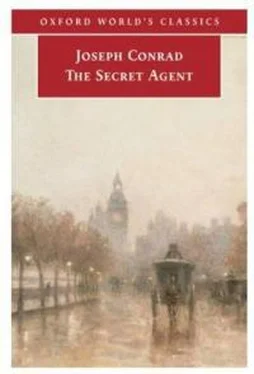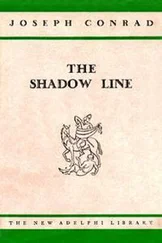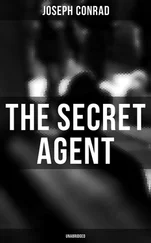Джозеф Конрад - The secret agent
Здесь есть возможность читать онлайн «Джозеф Конрад - The secret agent» весь текст электронной книги совершенно бесплатно (целиком полную версию без сокращений). В некоторых случаях можно слушать аудио, скачать через торрент в формате fb2 и присутствует краткое содержание. Год выпуска: 2004, ISBN: 2004, Издательство: Random House, Inc., Жанр: Классическая проза, на английском языке. Описание произведения, (предисловие) а так же отзывы посетителей доступны на портале библиотеки ЛибКат.
- Название:The secret agent
- Автор:
- Издательство:Random House, Inc.
- Жанр:
- Год:2004
- ISBN:9780812973051
- Рейтинг книги:4 / 5. Голосов: 1
-
Избранное:Добавить в избранное
- Отзывы:
-
Ваша оценка:
- 80
- 1
- 2
- 3
- 4
- 5
The secret agent: краткое содержание, описание и аннотация
Предлагаем к чтению аннотацию, описание, краткое содержание или предисловие (зависит от того, что написал сам автор книги «The secret agent»). Если вы не нашли необходимую информацию о книге — напишите в комментариях, мы постараемся отыскать её.
Based on the text which Conrad's first English readers enjoyed, this new edition includes a full and up-to-date bibliography, a comprehensive chronology and a critical introduction which describes Conrad's great London novel as the realization of a "monstrous town," a place of idiocy, madness, criminality, and butchery. It also discusses contemporary anarchist activity in the UK, imperialism, and Conrad's narrative techniques
The secret agent — читать онлайн бесплатно полную книгу (весь текст) целиком
Ниже представлен текст книги, разбитый по страницам. Система сохранения места последней прочитанной страницы, позволяет с удобством читать онлайн бесплатно книгу «The secret agent», без необходимости каждый раз заново искать на чём Вы остановились. Поставьте закладку, и сможете в любой момент перейти на страницу, на которой закончили чтение.
Интервал:
Закладка:
This was then the famous and trusty secret agent, so secret that he was never designated otherwise but by the symbol Δ in the late Baron Stott–Wartenheim's official, semi–official, and confidential correspondence; the celebrated agent Δ, whose warnings had the power to change the schemes and the dates of royal, imperial, grand ducal journeys, and sometimes caused them to be put off altogether! This fellow! And Mr Vladimir indulged mentally in an enormous and derisive fit of merriment, partly at his own astonishment, which he judged naive, but mostly at the expense of the universally regretted Baron Stott–Wartenheim. His late Excellency, whom the august favour of his Imperial master had imposed as Ambassador upon several reluctant Ministers of Foreign Affairs, had enjoyed in his lifetime a fame for an owlish, pessimistic gullibility. His Excellency had the social revolution on the brain. He imagined himself to be a diplomatist set apart by a special dispensation to watch the end of diplomacy, and pretty nearly the end of the world, in a horrid democratic upheaval. His prophetic and doleful despatches had been for years the joke of Foreign Offices. He was said to have exclaimed on his deathbed (visited by his Imperial friend and master): "Unhappy Europe! Thou shalt perish by the moral insanity of thy children!" He was fated to be the victim of the first humbugging rascal that came along, thought Mr Vladimir, smiling vaguely at Mr Verloc.
"You ought to venerate the memory of Baron Stott–Wartenheim," he exclaimed suddenly.
The lowered physiognomy of Mr Verloc expressed a sombre and weary annoyance.
"Permit me to observe to you," he said, "that I came here because I was summoned by a peremptory letter. I have been here only twice before in the last eleven years, and certainly never at eleven in the morning. It isn't very wise to call me up like this. There is just a chance of being seen. And that would be no joke for me."
Mr Vladimir shrugged his shoulders.
"It would destroy my usefulness," continued the other hotly.
"That's your affair," murmured Mr Vladimir, with soft brutality. "When you cease to be useful you shall cease to be employed. Yes. Right off. Cut short. You shall—" Mr Vladimir, frowning, paused, at a loss for a sufficiently idiomatic expression, and instantly brightened up, with a grin of beautifully white teeth. "You shall be chucked," he brought out ferociously.
Once more Mr Verloc had to react with all the force of his will against that sensation of faintness running down one's legs which once upon a time had inspired some poor devil with the felicitous expression: "My heart went down into my boots." Mr Verloc, aware of the sensation, raised his head bravely.
Mr Vladimir bore the look of heavy inquiry with perfect serenity.
"What we want is to administer a tonic to the Conference in Milan," he said airily. "Its deliberations upon international action for the suppression of political crime don't seem to get anywhere. England lags. This country is absurd with its sentimental regard for individual liberty. It's intolerable to think that all your friends have got only to come over to—"
"In that way I have them all under my eye," Mr Verloc interrupted huskily.
"It would be much more to the point to have them all under lock and key. England must be brought into line. The imbecile bourgeoisie of this country make themselves the accomplices of the very people whose aim is to drive them out of their houses to starve in ditches. And they have the political power still, if they only had the sense to use it for their preservation. I suppose you agree that the middle classes are stupid?"
Mr Verloc agreed hoarsely.
"They are."
"They have no imagination. They are blinded by an idiotic vanity. What they want just now is a jolly good scare. This is the psychological moment to set your friends to work. I have had you called here to develop to you my idea."
And Mr Vladimir developed his idea from on high, with scorn and condescension, displaying at the same time an amount of ignorance as to the real aims, thoughts, and methods of the revolutionary world which filled the silent Mr Verloc with inward consternation. He confounded causes with effects more than was excusable; the most distinguished propagandists with impulsive bomb throwers; assumed organisation where in the nature of things it could not exist; spoke of the social revolutionary party one moment as of a perfectly disciplined army, where the word of chiefs was supreme, and at another as if it had been the loosest association of desperate brigands that ever camped in a mountain gorge. Once Mr Verloc had opened his mouth for a protest, but the raising of a shapely, large white hand arrested him. Very soon he became too appalled to even try to protest. He listened in a stillness of dread which resembled the immobility of profound attention.
"A series of outrages," Mr Vladimir continued calmly, "executed here in this country; not only planned here—that would not do—they would not mind. Your friends could set half the Continent on fire without influencing the public opinion here in favour of a universal repressive legislation. They will not look outside their backyard here."
Mr Verloc cleared his throat, but his heart failed him, and he said nothing.
"These outrages need not be especially sanguinary," Mr Vladimir went on, as if delivering a scientific lecture, "but they must be sufficiently startling—effective. Let them be directed against buildings, for instance. What is the fetish of the hour that all the bourgeoisie recognise—eh, Mr Verloc?"
Mr Verloc opened his hands and shrugged his shoulders slightly.
"You are too lazy to think," was Mr Vladimir's comment upon that gesture. "Pay attention to what I say. The fetish of to–day is neither royalty nor religion. Therefore the palace and the church should be left alone. You understand what I mean, Mr Verloc?"
The dismay and the scorn of Mr Verloc found vent in an attempt at levity.
"Perfectly. But what of the Embassies? A series of attacks on the various Embassies," he began; but he could not withstand the cold, watchful stare of the First Secretary.
"You can be facetious, I see," the latter observed carelessly. "That's all right. It may enliven your oratory at socialistic congresses. But this room is no place for it. It would be infinitely safer for you to follow carefully what I am saying. As you are being called upon to furnish facts instead of cock–and–bull stories, you had better try to make your profit off what I am taking the trouble to explain to you. The sacrosanct fetish of to–day is science. Why don't you get some of your friends to go for that wooden–faced panjandrum—eh? Is it not part of these institutions which must be swept away before the F. P. comes along?"
Mr Verloc said nothing. He was afraid to open his lips lest a groan should escape him.
"This is what you should try for. An attempt upon a crowned head or on a president is sensational enough in a way, but not so much as it used to be. It has entered into the general conception of the existence of all chiefs of state. It's almost conventional—especially since so many presidents have been assassinated. Now let us take an outrage upon—say a church. Horrible enough at first sight, no doubt, and yet not so effective as a person of an ordinary mind might think. No matter how revolutionary and anarchist in inception, there would be fools enough to give such an outrage the character of a religious manifestation. And that would detract from the especial alarming significance we wish to give to the act. A murderous attempt on a restaurant or a theatre would suffer in the same way from the suggestion of non–political passion: the exasperation of a hungry man, an act of social revenge. All this is used up; it is no longer instructive as an object lesson in revolutionary anarchism. Every newspaper has ready–made phrases to explain such manifestations away. I am about to give you the philosophy of bomb throwing from my point of view; from the point of view you pretend to have been serving for the last eleven years. I will try not to talk above your head. The sensibilities of the class you are attacking are soon blunted. Property seems to them an indestructible thing. You can't count upon their emotions either of pity or fear for very long. A bomb outrage to have any influence on public opinion now must go beyond the intention of vengeance or terrorism. It must be purely destructive. It must be that, and only that, beyond the faintest suspicion of any other object. You anarchists should make it clear that you are perfectly determined to make a clean sweep of the whole social creation. But how to get that appallingly absurd notion into the heads of the middle classes so that there should be no mistake? That's the question. By directing your blows at something outside the ordinary passions of humanity is the answer. Of course, there is art. A bomb in the National Gallery would make some noise. But it would not be serious enough. Art has never been their fetish. It's like breaking a few back windows in a man's house; whereas, if you want to make him really sit up, you must try at least to raise the roof. There would be some screaming of course, but from whom? Artists—art critics and such like—people of no account. Nobody minds what they say. But there is learning—science. Any imbecile that has got an income believes in that. He does not know why, but he believes it matters somehow. It is the sacrosanct fetish. All the damned professors are radicals at heart. Let them know that their great panjandrum has got to go too, to make room for the Future of the Proletariat. A howl from all these intellectual idiots is bound to help forward the labours of the Milan Conference. They will be writing to the papers. Their indignation would be above suspicion, no material interests being openly at stake, and it will alarm every selfishness of the class which should be impressed. They believe that in some mysterious way science is at the source of their material prosperity. They do. And the absurd ferocity of such a demonstration will affect them more profoundly than the mangling of a whole street—or theatre—full of their own kind. To that last they can always say: 'Oh! it's mere class hate.' But what is one to say to an act of destructive ferocity so absurd as to be incomprehensible, inexplicable, almost unthinkable; in fact, mad? Madness alone is truly terrifying, inasmuch as you cannot placate it either by threats, persuasion, or bribes. Moreover, I am a civilised man. I would never dream of directing you to organise a mere butchery, even if I expected the best results from it. But I wouldn't expect from a butchery the result I want. Murder is always with us. It is almost an institution. The demonstration must be against learning—science. But not every science will do. The attack must have all the shocking senselessness of gratuitous blasphemy. Since bombs are your means of expression, it would be really telling if one could throw a bomb into pure mathematics. But that is impossible. I have been trying to educate you; I have expounded to you the higher philosophy of your usefulness, and suggested to you some serviceable arguments. The practical application of my teaching interests you mostly. But from the moment I have undertaken to interview you I have also given some attention to the practical aspect of the question. What do you think of having a go at astronomy?"
Читать дальшеИнтервал:
Закладка:
Похожие книги на «The secret agent»
Представляем Вашему вниманию похожие книги на «The secret agent» списком для выбора. Мы отобрали схожую по названию и смыслу литературу в надежде предоставить читателям больше вариантов отыскать новые, интересные, ещё непрочитанные произведения.
Обсуждение, отзывы о книге «The secret agent» и просто собственные мнения читателей. Оставьте ваши комментарии, напишите, что Вы думаете о произведении, его смысле или главных героях. Укажите что конкретно понравилось, а что нет, и почему Вы так считаете.












